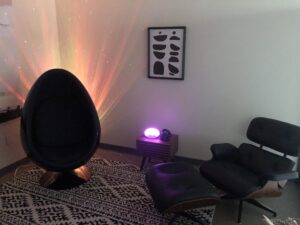Meditation Pods
Meditation has long been proven to boost mental, emotional, and physical well-being. Now, virtual reality meditation programs are taking these benefits to the next level, delivering even greater improvements in health and wellness. Curious about how meditation can work for you? Try our newly updated meditation pods, featuring immersive virtual reality guided sessions. Available for individual rental or as part of a comprehensive Southwest Counselling service package.
Mindfulness, as defined by Jon Kabat-Zinn, is “the awareness that arises through paying attention, on purpose, in the present moment, non-judgmentally… in the service of self-understanding and wisdom.” Whether through formal practices like meditation or guided imagery, or informally by staying present while doing simple tasks like walking or washing dishes, mindfulness can be transformative.
Here are just a few of the many benefits you can experience from meditation:
- Reduced fatigue[1]
- Sharper focus, better memory, and enhanced executive function[2] [3] [4]
- Greater goal persistence or mental flexibility, depending on the meditation style[5]
- Positive changes in brain structure that help regulate emotions[6]
- Increased creativity and improved problem-solving skills[7]
- Boosted mental health and lower stress[8]
- Lower cholesterol, improved blood pressure, and higher levels of good cholesterol (HDL)[9]
- Virtual reality meditations have shown to improve sleep quality, reduce stress, and enhance autonomic nervous system balance — even outperforming traditional meditation techniques when it comes to motor skills performance under pressure[10]

[1] Zeidan, Fadel, Susan K. Johnson, Bruce J. Diamond, Zhanna David, and Paula Goolkasian. “Mindfulness meditation improves cognition: Evidence of brief mental training” in Consciousness and Cognition (San Diego: Elsevier Inc, 2010) 19, no. 2: 597–605. https://doi.org/10.1016/j.concog.2010.03.014 [2] Marciniak, Rafał, Katerina Sheardova, Pavla Čermáková, Daniel Hudeček, Rastislav Šumec, and Jakub Hort. "Effect of Meditation on Cognitive Functions in the Context of Aging and Neurodegenerative Diseases." Frontiers in Behavioral Neuroscience (Lausanne: Frontiers Media Sa, 2014) 8: 17. [3] Walsh, Roger and Shauna L. Shapiro. "The Meeting of Meditative Disciplines and Western Psychology: A Mutually Enriching Dialogue." American Psychologist (Washington: American Psychological Association, 2006) 61: 227–239. [4] Zeidan et al. [5] Colzato, Lorenza S., Pauline van der Wel, Roberta Sellaro, and Bernhard Hommel. "A Single Bout of Meditation Biases Cognitive Control but Not Attentional Focusing: Evidence from the Global–Local Task." Consciousness and Cognition (San Diego: Elsevier Inc, 2016) 39: 1 - 7. https://doi.org/10.1016/j.concog.2015.11.003. [6] Kang, Do-Hyung, Hang Joon Jo, Wi Hoon Jung, Sun Hyung Kim, Ye-Ha Jung, Chi-Hoon Choi, Ul Soon Lee, Seung Chan An, Joon Hwan Jang, and Jun Soo Kwon. "The Effect of Meditation on Brain Structure: Cortical Thickness Mapping and Diffusion Tensor Imaging." Social Cognitive and Affective Neuroscience (Oxford: Oxford University Press, 2013) 8, no. 1: 27–33. https://doi.org/10.1093/scan/nss056. [7] Walsh and Shapiro. [8] Zollars, Irene, Therese Poirier, & Junvie Pailden, “Effects of mindfulness meditation on mindfulness, mental well-being, and perceived stress.” Currents in Pharmacy Teaching and Learning, (United States: Elsevier Inc, 2019) 11(10): 1022–1028. [9] Jamil, Aneeque, Sai Dheeraj Gutlapalli, Marya Ali, Mrinal J. P. Oble, Shamsun Nahar Sonia, Sherie George, Srushti R. Shahi, Zahra Ali, Abdelrahman Abaza, and Lubna Mohammed. "Meditation and Its Mental and Physical Health Benefits in 2023." Cureus (Palo Alto, CA, 2023) 15, no. 6: e40650. https://doi.org/10.7759/cureus.40650. [10] Wagner, Mattias and Alissa Wieczorek. "Ego-Depletion and Motor Skill Performance under Pressure—Experimental Effects of a Short-Term Virtual-Reality Based Mindfulness Breathing Meditation with Integrated Biofeedback." Scientific Reports (London: Nature Publishing Group UK, 2024) 14, no. 1: 17541. https://doi.org/10.1038/s41598-024-68043-0.

